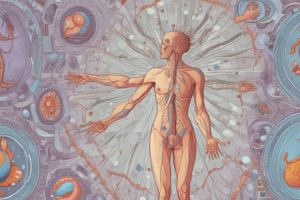Podcast
Questions and Answers
What is the primary function of the immune system?
What is the primary function of the immune system?
- To defend against infectious agents and disease (correct)
- To produce hormones
- To regulate body temperature
- To aid in digestion
What type of immunity involves the production of antibodies?
What type of immunity involves the production of antibodies?
- Adaptive immunity
- Cell-mediated immunity
- Innate immunity
- Humoral immunity (correct)
What is the term for the ability of an antigen to trigger an immune response?
What is the term for the ability of an antigen to trigger an immune response?
- Autoimmunity
- Immunogenicity (correct)
- Immunotolerance
- Hypersensitivity
Which of the following is an example of a primary lymphoid organ?
Which of the following is an example of a primary lymphoid organ?
What is the term for an excessive or abnormal immune response?
What is the term for an excessive or abnormal immune response?
What is the term for an immune response against self-antigens?
What is the term for an immune response against self-antigens?
Flashcards are hidden until you start studying
Study Notes
Overview of Immunology
- Study of the immune system and its functions
- Deals with the defense against infectious agents and disease
Branches of Immunology
- Innate Immunology: study of non-specific, immediate defense mechanisms
- Physical barriers (skin, mucous membranes)
- Cellular components (neutrophils, macrophages)
- Adaptive Immunology: study of specific, delayed defense mechanisms
- Humoral immunity (antibodies)
- Cell-mediated immunity (T-cells)
Immune Response
- Recognition: pathogen recognition by immune cells
- Activation: activation of immune cells (e.g., T-cells, B-cells)
- Elimination: elimination of pathogens by immune cells
- Memory: immune system "remembers" pathogens for future responses
Cells of the Immune System
- Leukocytes (white blood cells):
- Neutrophils
- Lymphocytes (B-cells, T-cells)
- Monocytes
- Eosinophils
- Basophils
- Antigen-Presenting Cells (APCs):
- Dendritic cells
- Macrophages
- B-cells
Immune System Organs
- Primary Lymphoid Organs:
- Bone marrow
- Thymus
- Secondary Lymphoid Organs:
- Spleen
- Lymph nodes
- Lymphoid tissues (e.g., tonsils, Peyer's patches)
Immunological Concepts
- Immunogenicity: ability of an antigen to trigger an immune response
- Immunotolerance: inability to respond to an antigen
- Autoimmunity: immune response against self-antigens
- Hypersensitivity: excessive or abnormal immune response
Studying That Suits You
Use AI to generate personalized quizzes and flashcards to suit your learning preferences.




